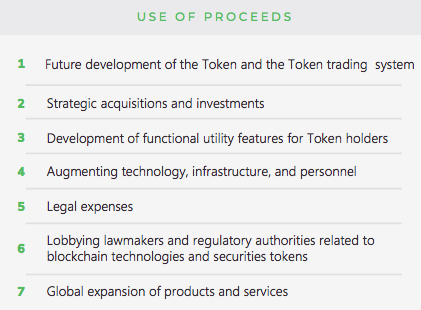Exchanges
A Deep Dive on Overstock’s tZERO and the Benefits of Security Tokens
Disclaimer: The author and editors are not securities professionals and nothing in the following should be construed as investment advice.
tZero, a subsidiary of Overstock (OSTK), is focused on developing a Blockchain-based SEC compliant alternative trading system (ATS) specifically focused on tokenized securities. Security tokens are actual financial securities, like shares or equity in traditional assets, start-ups, venture funds even real estate. These tokens provide investors various rights and obligations in the company whose securities they are purchasing. They represent a much smaller share of the market than utility tokens, but many leading experts believe that the paradigm is going to shift as 2018 progresses.
The target market for the tZero platform are companies looking to launch security tokens to provide liquidity and smart trading through a regulated exchange. Trading has been live for some time, but only a handful of preferred equities currently trade on it. The key differentiator between this platform and a classic stock trading business is the support for tokenized securities, creating a more liquid and accessible trading platform. As of now, the only publicly announced tokenized security planned to trade on the platform is KodakCoin.
Token Sale
The tZero token sale is still in progress and it aims to raise $250 million to fund platform development. Early on in the process, Overstock CEO Patrick Byrne indicated there was heavy investor demand with over “1000 phone calls”, so the tZero team initially expected to reach the $250 million goal by mid-February 2018. However, per their Form D Exemption Notice (dated February 23rd), the amount raised was closer to $64.3 million. On March 1st, Byrne announced the token sale had crossed the $100 million mark but the exact number won’t be divulged until their next Form D Exemption is available. (It should be noted that a sizable chunk of this investment could be from Overstock which reportedly was looking to purchase $30 million.)
In addition, tZero announced that it had extended the offering until May 14, which could be in response to gun-shy investors who may have been rattled by the SEC probe and uncertainty around the ICO process in general.
Current Regulatory Environment
The excitement over token offerings has been dampened by recent SEC regulatory guidance. Companies have been utilizing SAFT or SAFE agreements to facilitate their offerings, which are often criticized as simple regulatory arbitrage to not have them called securities. The SAFT is a broad concept that explains how token issuers could remain on the “right side” of securities law when issuing what basically amounts to coupons for tokens at a future date when the platform they are used on is complete. The fear is that the SEC will say that many of the SAFT agreements are invalid and didn’t abide by securities laws, which would be detrimental to many projects.
If the SEC does deem these offerings securities, the platforms that have sold them will be deemed illegal securities trading/offerings. tZero sold their tokens exclusively to accredited investors via a SAFE agreement, which makes it slightly less vulnerable to such a drastic determination by the SEC. However, it may hinder interest in launching security tokens and reduce the appetite for companies to utilize the tZero platform; at least until the dust has settled and better regulatory framework is in place.
Security Tokens Benefits (in general)
To understand why the tZero platform may succeed, it’s important to understand the strengths that a security token can provide to an issuer over the more traditional avenues of financing:
- Lower Fees — Many fees associated with financial transactions are derived from payments owed to middlemen (bankers, etc). Security Tokens remove the need for most bankers which reduces fees, and smart contracts may one day decrease the reliance on lawyers as well. These smart contracts will reduce the complexity, costs and paperwork with managing securities (collecting signatures, wiring of funds, mailing of distribution checks, collection of W-2s, Sending K-9s, etc).
- Faster deal execution— The more people involved in a deal, the longer it usually takes to execute. Security tokens remove middlemen from investment transactions, enabling an accelerated timeline for issuers to successfully offer their security. Additionally, immediate trade settlement on the secondary market for Security Tokens will become an attractive advantage for issuers & investors too.
- Free market exposure — Most investment transactions today lack exposure to a global investor base. For example, it is hard for investors in Asia to invest in private US companies or real estate. With Security Tokens, asset owners simply market their deals to anyone with an internet connection (within regulatory limits). This free market exposure should lead to a significant change in asset valuations since any asset that is not exposed to a free market is mispriced.
- Larger investor base — When asset owners can present deals to anyone with an internet connection, the potential investor base is drastically increased. For example, would you rather show your investment opportunity to only US accredited investors & institutions or every potential investor in the world? Competition is healthy and a long-term net good for financial markets.
- Automated service functions — Lawyers are less middlemen and more service providers in most transactions. With Security Tokens, issuers will begin to use smart contracts to automate the service provider function through software. This doesn’t mean that lawyers will disappear, but rather that their role will be more advisory based.
- Lack of financial institution manipulation — This is a complex topic that is sure to be controversial. The short explanation is the likelihood for corruption and manipulation by financial institutions is decreased if those institutions are removed from the investment transaction process. The “Digital Locate Receipt Software” utilized by the tZero platform attempts to address this.
Use Case for Token
In these new tokenized offerings, it’s important to ask what the token’s purpose is. The tZero token is not a core aspect of its trading system, and it is not required for trading on the platform. Per their whitepaper, the primary goal of the token sale “is to raise capital to support tZERO’s business.” While raising capital is a legitimate reason for a token sale, it is still important to note that (as of now) the token has no specific use in the platform. This allows for token sale proceeds to be used to build out the platform in different ways. Below is a screenshot of the “Use of Proceeds” listed on the tZero website.
Token Value
According to the offering documents, the Tzero token pays “10% adjusted gross revenue to token holders (distributed) on a quarterly basis”. This is basically a dividend, so the value of the token to investors will be entirely dependent on the revenue generated by the tZero platform, with potentially additional “Discretionary Benefits” in the future. These will not be a part of the terms and conditions of the tokens, but rather benefits voluntarily provided by the Company to token holders. These Discretionary Benefits may be withdrawn or changed at any time at management’s discretion.” — tZero Token Sale Memorandum
The Company also stated they will attempt to incorporate some utility benefits, but have made no disclosures, and these are entirely up to the discretion of the management.
Summary
If the benefits for tokenized securities begin to hold enough weight to become a popular method for companies to raise funding, tZero could position itself as the go-to platform for regulatory-compliant trading of security tokens. Tokenized securities may have a bright future, and if tZero can succeed in becoming industry leader of this area, it could become an incredibly profitable business. However, the current market is very immature from a technological and regulatory standpoint. It is unlikely that tokenized securities will become a large trend for companies in the short term (2+ years), as potential benefits are outweighed by regulatory overhang for the time being. The key value driver for the tZero platform will be onboarding and supporting additional security tokens from established companies, such as Kodak.
Even long-term crypto bulls may be uncomfortable with the high valuation that’s been assigned by the market to an unproven tZero platform. I credit some of this to investors wanting exposure to the crypto-asset market without buying the crypto-assets themselves, and Overstock having positioned itself as the equity proxy.
Lastly, the raising of $250 million via a token sale speaks loudly about management. In my opinion, these types of cash raises could demonstrate a team that may be blurred by the short-term and not focused on creating long-term value from the project.
Competing Project(s)
- Templum Trading is also attempting to become a regulated alternative trading system (ATS). It raised $2.7 million in funding from Raptor Group, Galaxy Investment Partners, Blockchain Capital, and firstminute.capital. Notice the far smaller size of raise here compared to tZero ICO.
Bull Case
- Security token offerings become a popular method for companies to fundraise projects, and the tZero platform is the go-to exchange for many of them.
- SEC regulation produces lax guidelines that need to be followed for security tokens. Having this will force the offerings to professionalize themselves and tZero may become one of the few legally compliant exchanges to launch these new tokens.
- tZero token sale raises the expected $250 million
Bear Case
- Security token offerings do not catch on in the near term, leading to launches that are few and far between.
- Token sale will not raise the full $250 million, leading investors to feeling duped by the bullish claims made my management.
- SEC regulatory crackdown on tokenized securities will diminish appetite for these securities by both investors and companies. If the regulations are harsh enough, the need for a securitized token may not be there.
- tZero does not become the go to liquidity platform and will be in a space with many other competitors.
- Overstock positioning itself as a “proxy” for crypto investing by Wall Street firms who directly invest in the tokens will diminish as they realize this is a flawed way of gaining exposure to the crypto-asset market.
Open Questions
- Is there interest from securities to use the tZero platform outside of tokenized ones such as Kodak Coin?
- Are there other companies that are in the pipeline to launch their tokenized securities on the tZero platform?
- Does the initial $100M of tZero tokens sold include the ~$30 million Overstock was planning on investing?
- Would tZero ever list utility tokens in addition to security tokens?
Big thanks to Derek Hsue and Ash Egan for feedback on this piece. An earlier version of this story originally appeared on Medium.







You must be logged in to post a comment Login